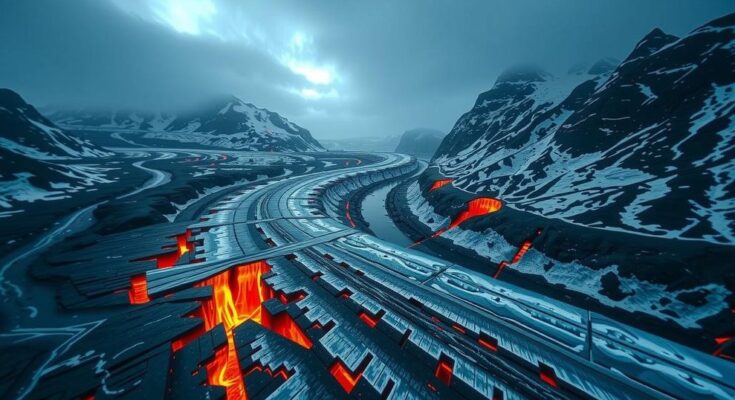A new study raises concerns that the rapid melting of glaciers may trigger an increase in volcanic eruptions in ice-covered regions, including Iceland. Scientists from various institutions are investigating this potential link via a collaborative research project. They posit that as glaciers retreat, the pressure on the Earth’s crust diminishes, which may, in turn, induce volcanic activity. The potential ramifications include significant contributions to carbon emissions and accelerated sea-level rise, particularly from West Antarctic volcanoes.
Recent research has unveiled a concerning possibility that the rapid melting of glaciers may trigger an increase in volcanic eruptions, particularly in regions where volcanoes have remained ice-covered. A collaborative study involving the University of Iceland and eleven other institutions seeks to explore this potential relationship exacerbated by climate change. Currently, over half of Iceland’s volcanoes are concealed beneath ice, and scientists suggest that conditions conducive to heightened volcanic activity may be developing. Volcanic eruptions released into the atmosphere significant amounts of carbon dioxide, complicating the global climate crisis. Concern extends well beyond Iceland, particularly to the West Antarctic Ice Sheet, where existing volcanic systems could hasten ice melting and contribute to rising sea levels. Central to the study is the theory that the immense weight of glaciers exerts downward pressure on the Earth’s crust. This pressure effectively suppresses the ascent of magma from below. However, as glaciers retreat, this pressure is alleviated, potentially allowing for the generation of more magma and altering its trajectory, which may lead to an increase in eruptions. A prominent volcanologist from the US has compiled a list of the world’s most hazardous volcanoes situated beneath glacial cover, taking into account historical eruption data, the amount of ice present, and human populations residing nearby. Notably, seven of the top ten volcanoes identified are located within the Andes mountain range in South America. Further, British volcanologist John Smellie has indicated that Antarctica may possess as many as 100 to 150 active volcanoes, with satellite imaging revealing that the continent is losing more than 150 billion metric tons of ice annually. Smellie cautioned that if climate change activates a new phase of volcanism in the forthcoming decades, it would significantly accelerate the loss of Antarctic ice, contributing to sea-level rise, potentially inundating major coastal urban areas around the globe.
The relationship between climate change and volcanic activity has not been thoroughly explored until now. The study connects the consequences of global warming—namely, the melting of ice sheets and glaciers—with potential geological repercussions, specifically the increased likelihood of volcanic eruptions. The study is positioned at the intersection of geoscience and environmental science, outlining how the physical changes to the Earth’s surface due to melting ice could stimulate volcanic behavior. The implications of this research extend beyond Iceland, impacting global climate dynamics, particularly those associated with rising sea levels.
In conclusion, the study highlighted in this report raises critical questions about the interplay between climate change and geological activity, specifically the potential for increased volcanic eruptions as ice cover diminishes. The findings emphasize the need for further investigation into how melting glaciers could influence volcanic behavior and reinforce the urgency for addressing climate change comprehensively, considering its far-reaching impacts not only on human populations but also on geological processes. This research could pave the way for a deeper understanding of climate interactions with Earth’s geological systems, emphasizing the interconnectedness of our planet’s systems.
Original Source: www.asiafinancial.com




